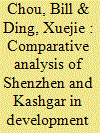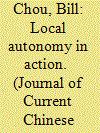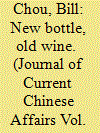| Srl | Item |
| 1 |
ID:
139539


|
|
|
|
|
| Summary/Abstract |
Kashgar, a westernmost city in the restive Xinjiang Uyghur Autonomous Region bordering Central and South Asia, was paired with the southern city of Shenzhen, the most successful special economic zone for its future development. The development of Kashgar’s economy in specific and the Xinjiang in general is a part of China’s new Silk Road project which serves multi-purpose goals, such as narrowing regional disparity, reducing ethnic tensions, fighting terrorism and balancing US pivot to Asia. It is skeptical whether the Shenzhen model can be transplanted into Kashgar. The plan of developing Kashgar’s economy and establishing Kashgar special economic zone may be considered a new bottle with old wine. The development programmes in the past several decades did not address the roots of ethnic tension, including suppression of cultural autonomy and unequal distribution of the benefits and social costs of economic growth. Besides that, the success of the Shenzhen special economic zone is an exception, not a rule. It was unsuccessful in the past attempts to transfer the successful experience from Shenzhen to other special economic zones. It is skeptical whether the Shenzhen experience can be transplanted to Kashgar, whose geographical location and investment environment was much inferior.
|
|
|
|
|
|
|
|
|
|
|
|
|
|
|
|
| 2 |
ID:
124243


|
|
|
|
|
| Publication |
2013.
|
| Summary/Abstract |
This paper investigates how Beijing governs its two special administrative regions (SARs) of Hong Kong and Macau through leverages on their local autonomy. First, a conceptual analysis of local autonomy will be provided. Local autonomy is more than a zero-sum game between the central and local authorities over how much power should be granted or taken from the local authorities; it also concerns the space for cultural expression and the use of local customs in public administration. Second, the degree of local autonomy in Hong Kong and Macau will be critically examined. On paper, both SAR governments are able to freely make decisions on a wide range of policies. In practice, however, Beijing has the absolute authority to override the decisions of Hong Kong and Macau. It is argued that the autonomy in cultural expression can compensate for the institutional constraints on the two SARs' decision- making power and is thus able to alleviate public discontent - as long as the constraints do not conflict with the people's core values and ways of life.
|
|
|
|
|
|
|
|
|
|
|
|
|
|
|
|
| 3 |
ID:
143107


|
|
|
|
|
| Summary/Abstract |
This paper reviews Beijing’s Hong Kong policy, arguing that the policy mirrors China’s policy towards its restive borderlands represented by Tibet and Xinjiang. The rule of Hong Kong and other borderlands in China will be understood in an analytical framework that highlights four broad policies of governing borderlands: promises of a high degree of local autonomy; extension of politico-administrative control; cultural assimilation; and economic integration and domination. These policies may be conceptualised within the term “coercion.” It is argued that before Hong Kong’s retrocession to China in 1997, the PRC’s approach to the territory, in comparison to its approaches to Tibet and Xinjiang, was the least coercive – that is, China initially promised Hong Kong a high degree of autonomy over domestic affairs. The degree of coercion was stepped up when Hongkongers were perceived as becoming increasingly alienated from the new regime.
|
|
|
|
|
|
|
|
|
|
|
|
|
|
|
|